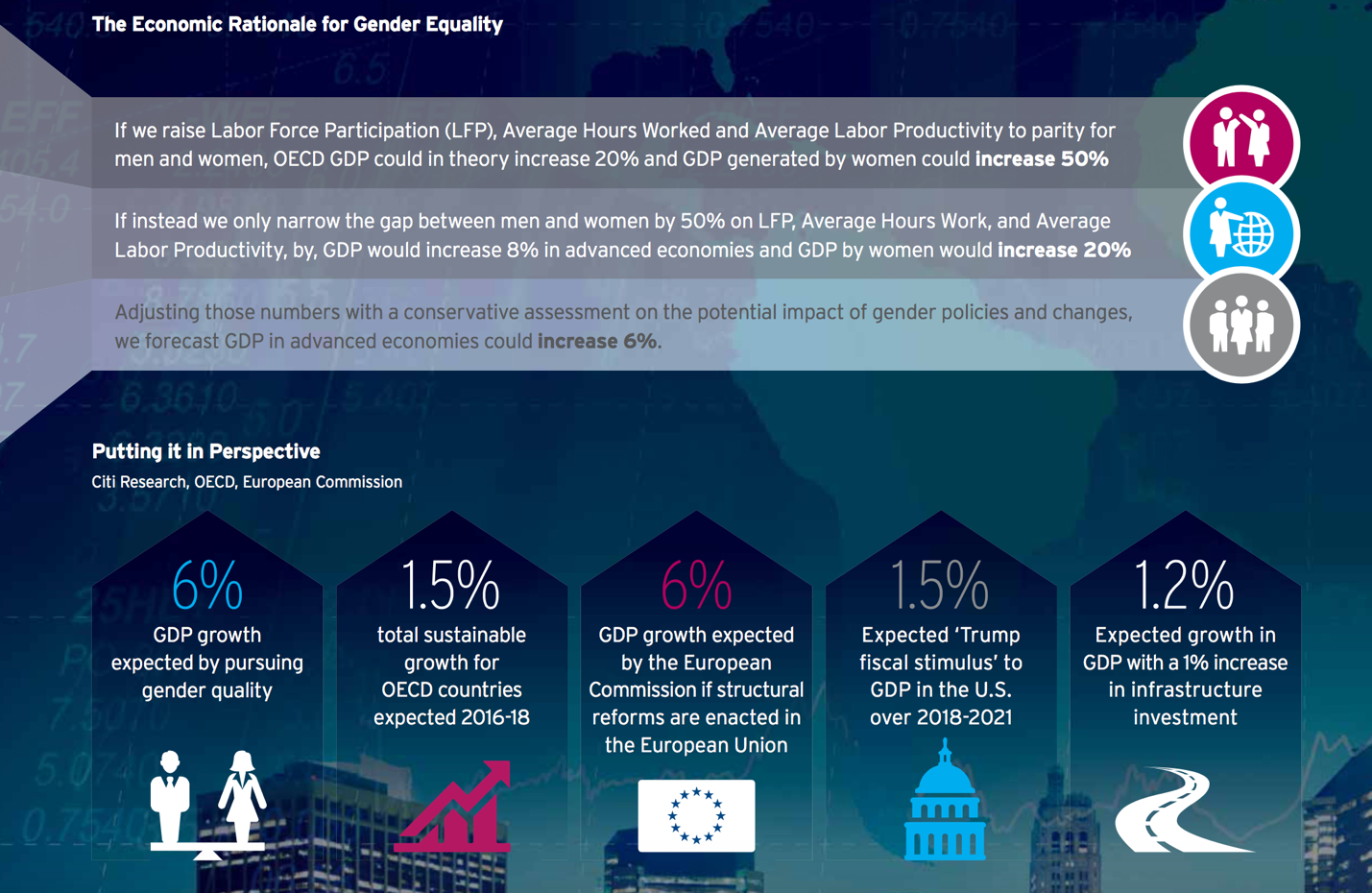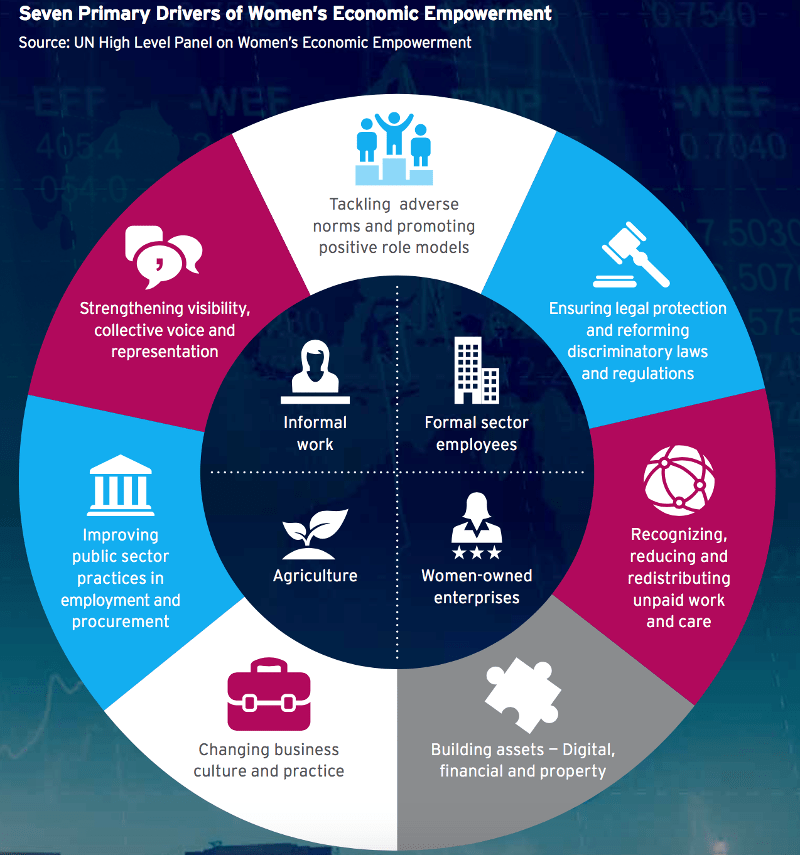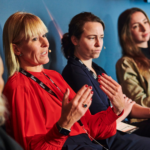
I recently came across a very thoughtful read by Citi Group titled “Women in the Economy II”. It is a follow up to a previous report, “Women in the Economy: Global Growth Generators” published in 2015. The report made the case for gender equity from an economic perspective and concluded that “significant but achievable reductions in workplace gender inequalities could add around 6% to GDP in the advanced economies over one to two decades.”
While women account for roughly 50% of working age population, a McKinsey Global Institute report from 2015 suggested that women currently account for only 37% of measured global GDP. In addition, not only are labor force participation rates for women consistently below that for men, working women also tend to work significantly fewer hours on average. With only 50 percent of working age women being in the labor force (compared to 77 percent of men) and a global gender wage gap of 24%, women continue to bear a heavier burden of unpaid work. According to the Citi report, women undertake about three times more unpaid care work than men; women’s unpaid work contributes $10 trillion per year globally (13 percent of global GDP). These hours are time taken away from paid work or leisure. High cost of childcare and elder care thus disproportionately impact women and can contribute to lower female labor force participation in societies where the family caregivers are typically female, further constraining women’s economic opportunities and outcomes. The so-called “motherhood penalty” result in earnings penalty, and consequently lower lifetime incomes for mothers and female caregivers.
This issue is particularly important for those nations facing an aging population such as Japan. According to the United Nations, the Japanese working-age population is expected to shrink by 15% between 2015 and 2035. Harnessing the potential of women workforce in the economy will be critical to protecting even modest growth prospects in the country.

Achieving gender equality is no small task. Success will require collaborative efforts from private and public sectors, as well as multilateral organizations and communities. The UN High-Level Panel has identified seven primary drivers of transformation (as summarized below), along with some ideas that can be undertaken to promote changes in policies and practices.
1. Tackle adverse norms and promote positive role models. Change discrimination and stereotypes that ascribe gender to abilities and roles.
2. Ensure legal protection and reform discriminatory laws against women to create level playing field with equal economic opportunities.
3. Recognize, reduce, and redistribute unpaid work and care. Increasing public spending on early education and child care and extending childcare subsidies for working parents can contribute to human development and gender equality. Mainstreaming equal responsibility for care between men and women throughout the education system and supporting flexible employment policies around work/life balance can help to foster social norms change around care.
4. Build financial, digital, and property assets for women. New digital technology innovations can help to accelerate women’s economic empowerment by providing them access to financial services, and ability to save for emergencies and start new businesses.
5. Change business culture and practices. Create measurable targets for gender diversity and advancement. Offer flexibility through parental and family leave systems, and ensure the systems do not penalize maternity leave or promote early retirement among women.
6. Improve public sector practices in employment and procurement. Promote gender equality by establishing gender targets or quotas for hiring and top-level positions, and measure progress against those targets.
7. Strengthen visibility, collective voice, and representation.

As highlighted in the report, Canada has demonstrated that with the proper policy changes and support structure in place for early education and childcare, inclusive growth can be attained and gender gap can be narrowed.
Building an inclusive global economy
Empowering women within labor force is not just about women working more hours, but about enabling them to achieve their full productive potential in the society. And it is an issue that crosses gender boundary: policies that tend to boost gender equality can also help to improve labor market outcomes more broadly.
The authors contended that completely eradicating the gender gaps would likely remain a long-term goal. In the short- and medium-term, the potential macroeconomic gains are probably somewhat smaller, but still significant, at 6% over the next one to two decades. Compare and contrast that figure with the situation in Japan and Italy, where estimated sustainable growth is around zero, the economic significance of pursuing gender equality is astounding.
As with most policies, there is no one-size-fits-all solution in attaining full gender equity. But creating a supportive enabling environment is a start and essential for lasting change. May 2018 bring renewed hope and actions towards establishing a more inclusive global economy. And we can all play a part in it.
The empowerment of the world’s women is a global imperative. Yet despite important progress in promoting gender equality, there remains an urgent need to address structural barriers to women’s economic empowerment and full inclusion in economic activity.
Ban Ki-Moon, Former Secretary General, United Nations
Post written by Theo Lau, LinkedIn’s Top Voices on #fintech and #femtech, Fintech Innovation, AARP










